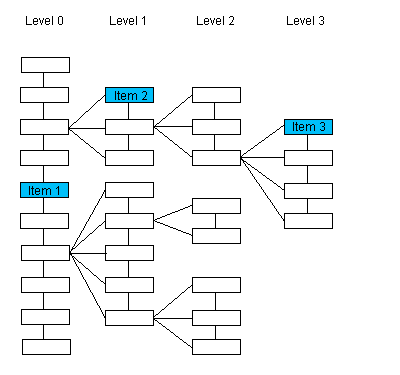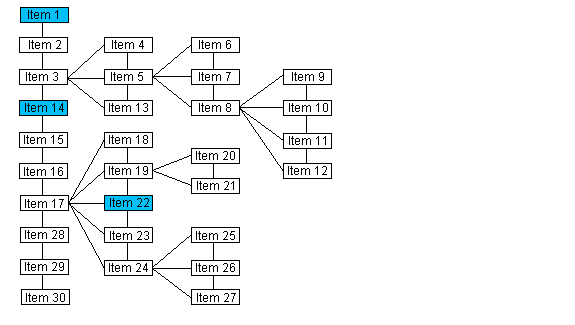FindPreviousElement Method
public DicomElement FindPreviousElement(DicomElement element,bool tree)
public:DicomElement^ FindPreviousElement(DicomElement^ element,bool tree)
Parameters
element
An item in the Data Set.
tree
true to evaluate the Data Set as a tree; false to evaluate the Data Set as a list.
Return Value
The previous item in the Data Set with a specified Tag, or a null reference (Nothing in VB) if a previous item with the specified Tag was not found.
Note: This method does not specify a Tag to use when searching. However the Tag that was used in the last call to FindFirstElement or FindLastElement is used by default when searching. For the sake of the following illustrations, the order of siblings is top to bottom.
If the Data Set is evaluated as a tree structure, this method returns the previous item on the same level as element, with the same parent as element.
Please note that the numbering of the items of interest in this first illustration is arbitrary and does not imply order.

| If the passed object points to: | The method returns an object pointing to: |
|---|---|
| Item 1 | The previous sibling (same level, same parent) of Item 1 , if such an item exists. If such an item does not exist, the method returns null. |
| Item 2 | The previous sibling (same level, same parent) of Item 2 , if such an item exists. If such an item does not exist, the method returns null. |
| Item 3 | The previous sibling (same level, same parent) of Item 3, if such an item exists. If such an item does not exist, the method returns null. |
If the Data Set is evaluated as a list, this method returns the previous item in the entire list .
Please note that the numbering of the items in the following illustration does indicate the order of the items when the Data Set is evaluated as a list.

| If the passed object points to: | The method returns an object pointing to: |
|---|---|
| Item 1 | The previous item in the list, if such an item exists. If an item with Tag tag is not found, null is returned. |
| Item 14 | The previous item in the list that has Tag tag, if such an item exists. If an item with Tag tag is not found, null is returned. |
| Item 22 | The previous item in the list that has Tag tag, if such an item exists. If an item with Tag tag is not found, null is returned. |
The following methods will also help you find elements in the Data Set with a specific Tag:
The following methods will help you find specific modules in the Data Set:
using Leadtools;using Leadtools.Dicom;public void LoadEnumerateSample(){string dicomFileName = Path.Combine(LEAD_VARS.ImagesDir, "DICOM", "image3.dcm");//Make sure to initialize the DICOM engine, this needs to be done only once//In the whole applicationDicomEngine.Startup();using (DicomDataSet ds = new DicomDataSet()){//Load DICOM Fileds.Load(dicomFileName, DicomDataSetLoadFlags.None);//Insert patient name element, if it doesn't already existDicomElement element = ds.FindFirstElement(null, DicomTag.PatientName, false);if (element == null){element = ds.InsertElement(null, false, DicomTag.PatientName, DicomVRType.PN, false, 0);}//The dataset should include the patient name element or an error occurredelement = ds.FindLastElement(null, DicomTag.PatientName, false);Debug.Assert(element != null);//There can be only one patient element in the root levelelement = ds.FindPreviousElement(null, false);Debug.Assert(element == null);element = ds.FindNextElement(null, false);Debug.Assert(element == null);element = ds.FindFirstElement(null, DicomTag.PatientName, false);//Since the patient name element is in the root level,//GetRootElement will return the same element.DicomElement element1 = ds.GetRootElement(element);Debug.Assert((element1.Tag == element.Tag), "GetRootElement should return same element");//Since the patient name element has no parent then GetParentElement will return nullelement1 = ds.GetParentElement(element);Debug.Assert(element1 == null, "GetParentElement should return null");//Since the patient name element has no children then GetChildElement will return nullelement1 = ds.GetChildElement(element, false);Debug.Assert(element1 == null, "GetChildElement should return null");element1 = ds.GetFirstElement(element, false, false);Debug.Assert(element1 != null, "GetFirstElement Can't return null in this case");element1 = ds.GetLastElement(element, false, false);Debug.Assert(element1 != null, "GetLastElement Can't return null in this case");element1 = ds.GetPreviousElement(element, false, true);DicomElement element2 = ds.GetNextElement(element, false, true);Debug.Assert(ds.GetElementLevel(element) == 0);Debug.Assert(ds.ExistsElement(element));Debug.Assert(ds.IsVolatileElement(element) == false);//Patient Name is not the only element in this levelDebug.Assert((element1 != null) && (element2 != null));//Delete the patient name elementds.DeleteElement(element);}DicomEngine.Shutdown();}static class LEAD_VARS{public const string ImagesDir = @"C:\LEADTOOLS22\Resources\Images";}
Reference
© 1991-2023 LEAD Technologies, Inc. All Rights Reserved.
